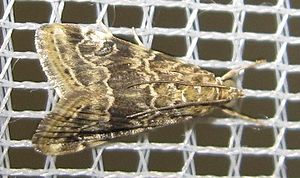Cabbage webworm facts for kids
Quick facts for kids Cabbage webworm |
|
|---|---|
 |
|
| Scientific classification | |
| Kingdom: | |
| Phylum: | |
| Class: | |
| Order: | |
| Family: | |
| Genus: |
Hellula
|
| Species: |
H. undalis
|
| Binomial name | |
| Hellula undalis (Fabricius, 1794)
|
|
| Synonyms | |
|
|
The cabbage webworm, also known as the Old World webworm, is a type of moth found in many parts of the world. Its scientific name is Hellula undalis. You can find this moth from Europe all the way across Asia to the Pacific Ocean. It was first discovered in Italy.
Contents
What Does It Look Like?
The cabbage webworm moth is quite small. Its wingspan (the distance from one wingtip to the other) is about 18 millimeters. That's less than an inch!
Adult Moths
Adult moths have light brown front wings. Each front wing has wavy pale lines and a mark shaped like a kidney. Their back wings are a plain gray color, getting darker near the edges.
The Caterpillars
The caterpillars are about 12 to 15 millimeters long. They are whitish with pinkish-brown stripes running along their bodies.
Where Do They Live and What Do They Eat?
Cabbage webworm caterpillars eat many different kinds of plants. They especially like plants from the Brassicaceae family. This family includes many common vegetables.
Favorite Foods
Some of their favorite foods are:
- broccoli
- different types of crucifers
- head cabbage
- Chinese cabbage
- spoon cabbage
- daikon radish
- horseradish
- mustard
- radish
- turnip
Because they eat so many important crops, these caterpillars are considered a serious agricultural pest. This means they can cause a lot of damage to farms.
How They Eat
When they are very young, the caterpillars bore into the stems of growing plants. As they get older, they start to mine the leaves and leaf stems. This means they tunnel inside the leaves, eating the plant from the inside.
They also create a web of silk around the area where they are feeding. This web collects their frass (which is insect poop).
Life Cycle
The cabbage webworm goes through a process called metamorphosis. This includes the egg, larva (caterpillar), pupa, and adult stages.
Pupation
After the caterpillar has eaten enough, it changes into a pupa. This change happens inside the silken web it made earlier. The pupa is about 8 millimeters long. It is shiny pale brown with a dark stripe on its back. The pupa forms inside a loose cocoon. This cocoon is made of silk mixed with small bits of soil or other materials.
 | May Edward Chinn |
 | Rebecca Cole |
 | Alexa Canady |
 | Dorothy Lavinia Brown |

